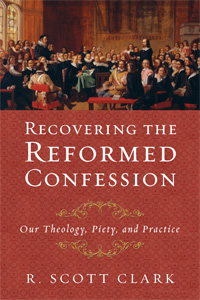If your congregation is in a confessional Reformed denomination/federation but it isn’t a Scripture-singing congregation, there’s a problem.
Semper Reformanda
Doctrine Without Scripture?
It appears that Mike Bird has offered some criticisms of our May 2004 faculty Statement on Justification. I reply below: Michael, I imagine that you are referring to the statement adopted by the faculty and board of Westminster Seminary California. A bit of . . . Continue reading →
What Does Semper Reformanda Actually Mean?
Mike Horton gives a terrific explanation at the Ligonier blog. Here’s a bit: “Some people today leave out the “Reformed” part or at least interpret it as “reformed” (little “r”): the church is “always being reformed according to the Word of God.” . . . Continue reading →
All Dressed Up With Nowhere to Go
An HB Classic on Recovering the Reformed Confession
I regularly receive an email that says: We love what we hear on the White Horse Inn and what we get from WSC and the HB and the like and we’ve visited ostensibly Reformed congregations in our area and none of them . . . Continue reading →
All Heretics Quote Scripture
An HB Classic
One of the Ecks (there were two) is (or was it Bob Godfrey?) reputed to have said (I can’t find the reference), “All heretics quote Scripture.” If he said it, he meant it as rebuke to Luther’s appeal to Scripture. Of course, . . . Continue reading →
Could Instruments Be Idols?
Friday, in the Medieval-Reformation course I gave a lecture on Calvin’s doctrine of worship during which a student asked about instruments. I replied that Calvin (and most of the Reformed) would have viewed the introduction of instruments into the service the same . . . Continue reading →
Clarkson: Public Worship To Be Preferred Before Private
“The Lord loveth the gates of Zion more than all the dwellings of Jacob.”—Ps 87:2 THAT we may apprehend the meaning of these words, and so thereupon raise some edifying observation, we must inquire into the reason why the Lord is said . . . Continue reading →
Heidelcast 31: Bringing Reformation To the Congregation
The Reformation is not only a doctrine and a piety. It is those two things but it is also a practice. It entails change in the life of the congregation, not for its own sake but for the sake of bringing that . . . Continue reading →
A Plan For Reforming Worship
Let’s say that a pastor decided that he wanted to reform the worship services of his congregation toward the earlier Reformed pattern of singing God’s Word without musical instruments. How would he go about it? Though we’re working with a concrete example, . . . Continue reading →
Calvin Didn’t Say Ecclesia Reformata, Semper Reformanda
These participles, reformata and reformanda, were not constantly on Calvin’s tongue. However, it is clear enough that his pattern was to use reformata as an adjective to describe a church that is more or less free of liturgical and theological abuses, and . . . Continue reading →
Always Abusing Semper Reformanda
The Reformation churches have some wonderful slogans that are chock full of important truths. Sometimes, however, these slogans can be misconstrued, misreported, and misunderstood. With the possible exception of sola Scriptura (by Scripture alone), none of these slogans has been mangled more . . . Continue reading →
Confessions Of A Former Charismatic
Dr. Clark, A few weeks ago you posted a warning against the desire for ongoing prophecy. [See also this—Ed.] In it you told a story of what happens when people look to words from God beyond Scripture. I wanted to stand as . . . Continue reading →
Too Late For This (Western) “Holy Week” But There Is Always Next Year: Rome Offers A Full Indulgence
A plenary indulgence can be obtained during Holy Week for oneself or for a deceased person if one of the following works established by the Church is performed. A plenary indulgence is a grace granted by the Catholic Church through the merits . . . Continue reading →
PCA Worship Is Better But It Has Some Distance Yet To Go
The state of worship in the Presbyterian Church in America is arguably better than it has ever been, at least as far as liturgy goes. More churches now use recognizably Reformed liturgies than at any point in the denomination’s history. These are . . . Continue reading →






